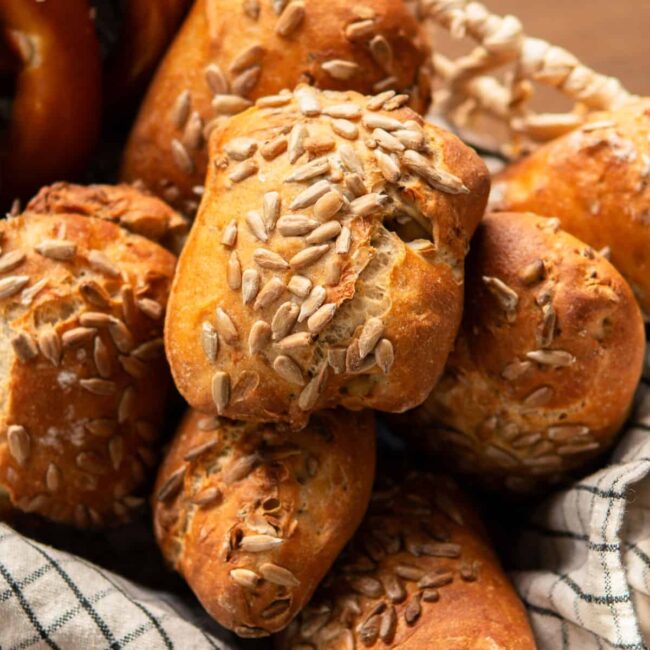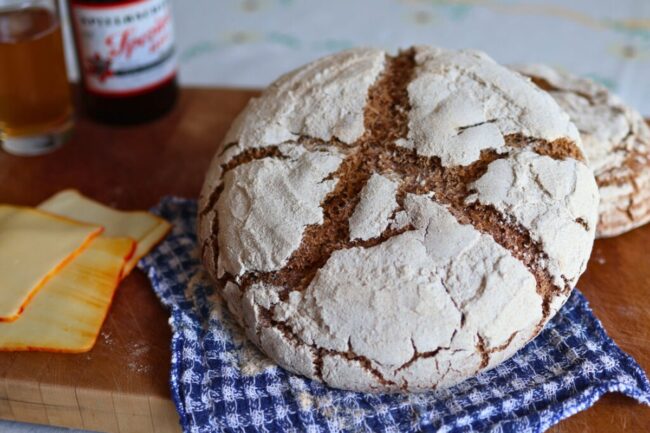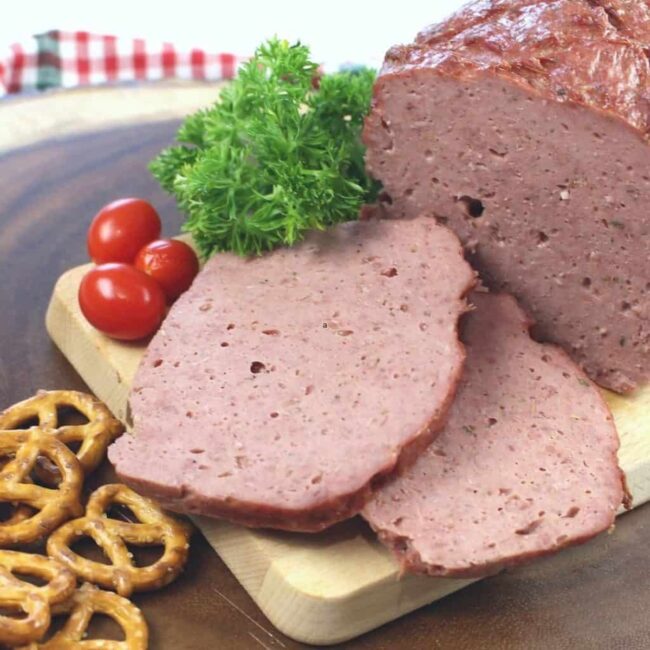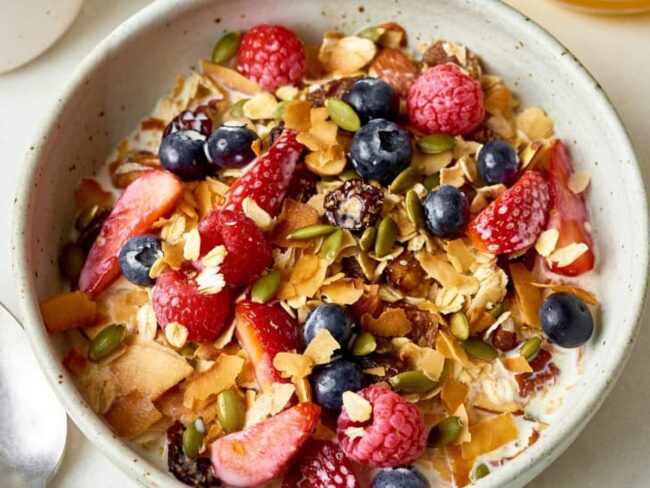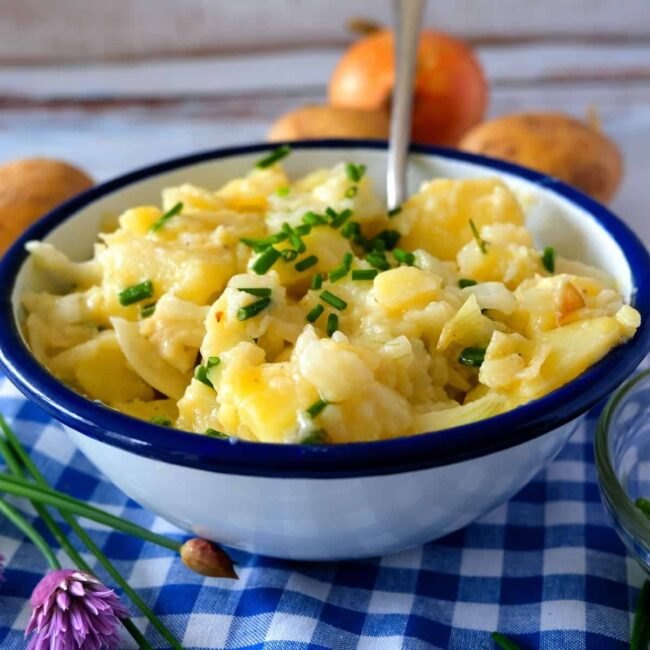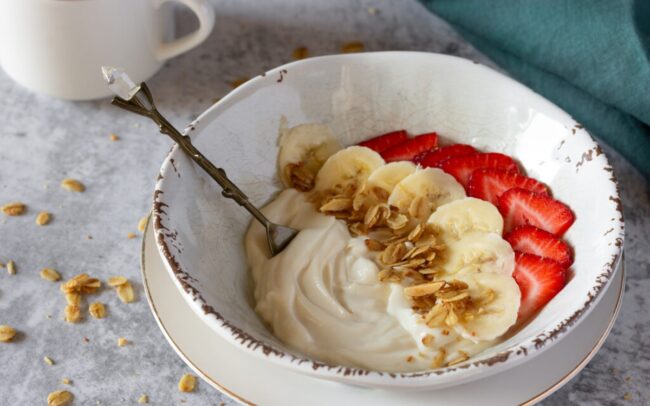15 Traditional German Breakfast Foods for a Hearty Start
Tasty German breakfast foods bring a comforting mix of hearty flavors and satisfying textures. Rich, fresh, and full of variety, they set the tone for a great morning.
Some highlight warm, rustic elements, while others offer lighter, crispier bites. A mix of sweet and savory flavors makes every meal interesting.
Tradition and quality ingredients shine through in every dish. These 15 flavorful breakfast options bring a taste of Germany to the table:
15 Traditional German Breakfasts for a Hearty Start
Start your morning with classic German breakfast foods. These filling and flavorful dishes are perfect for a satisfying meal.
Brotchen
Brötchen are delightful little bread rolls essential to a traditional German breakfast. Known for their crispy crust and soft, airy center, these rolls come in various styles such as plain, seeded, and whole grain.
Popularly enjoyed with butter or jam, they also make an excellent base for savory toppings like meats and cheeses. Many Germans even savor the experience of dipping these warm treats into their coffee.
The charm of Brötchen lies not just in their taste but also in the daily ritual of picking them up from local bakeries to start the day right.
Roggenbrot
Roggenbrot serves as a classic German rye bread known for its robust flavor and hearty nature. Crafted primarily from rye flour, this bread boasts a dense texture that stands out in any meal.
Its dark hue hints at the slightly tangy taste enriched by caraway seeds, which lend an aromatic touch to each slice. Commonly enjoyed at breakfast, thin slices of Roggenbrot are often adorned with butter, cheese, or assorted cold cuts, making it an excellent companion alongside your morning coffee or tea.
Not only does this nourishing option satisfy hunger with its high fiber content but also keeps you energized throughout the day ahead.
Brezel
Brezel, a quintessential German pretzel, stands out as a popular breakfast choice that captures the essence of traditional bakery offerings. Characterized by its unique twisted shape resembling a knot with two elongated arms, this treat is crafted from wheat flour dough and immersed briefly in baking soda before being baked to perfection.
The contrast between the dark brown crispy exterior and soft interior creates an enjoyable texture experience you can savor. Often enjoyed plain or generously sprinkled with coarse salt, these pretzels are commonly paired with butter or cheese for breakfast satisfaction alongside coffee or beer.
Sweet variations filled with chocolate or coated in sugar offer another delightful option for those craving something different during morning hours.
Weiwurst
Weißwurst is a traditional Bavarian breakfast sausage known for its distinct pale color and tender texture. Made primarily from minced veal and pork back bacon, these sausages are often served in warm water to maintain their juiciness.
With roots deeply embedded in local customs, they’re traditionally enjoyed before noon to avoid the tolling of church bells. To savor Weißwurst, you can peel off the casing or slice it open to enjoy the flavorful filling inside.
Complement this dish with sweet mustard and a freshly baked Brezen (soft pretzel) while pairing it with refreshing wheat beer for an authentic experience that captures Bavaria’s essence at breakfast time.
Leberkase
Leberkäse serves as a hearty German breakfast favorite that defies its name, which translates to “liver cheese,” although it contains neither. Crafted from finely minced beef, pork, and bacon mixed with aromatic spices, this dish is baked in a loaf pan until achieving a golden exterior.
Typically enjoyed in thick slices either on a fresh roll or alongside eggs, Leberkäse boasts an exceptionally smooth texture complemented by its rich flavors. A classic way to relish this delicacy includes pairing it with Brötchen and sweet mustard for an authentic experience.
This satisfying meal ensures you feel energized well into the day ahead.
Musli
Müsli offers a hearty start to the day, characterized by its wholesome blend of oats, nuts, seeds, and dried fruits. Creating your own version allows you to personalize it with ingredients like almonds or pumpkin seeds for added crunch.
A simple pinch of salt enhances the flavors beautifully while keeping everything fresh in an airtight container. When it's time for breakfast, just pour some into a bowl and add milk or yogurt; topping with fresh bananas or berries adds a refreshing touch.
This energizing meal is not only satisfying but also supports sustained vitality throughout your busy morning routine.
Schwarzwalder Schinken
Schwarzwälder Schinken stands out as a renowned German delicacy, celebrated for its unique dry-curing and smoking techniques. Originating from the picturesque Black Forest region, this ham boasts a striking dark outer layer that conceals its tender pinkish-red flesh.
The savory profile emerges from an artful combination of salt, garlic, and spices that enrich the curing process. Sliced paper-thin, it pairs exceptionally well with rustic German bread or rolls.
Enjoying it alone is satisfying; however, I love layering it in open-faced sandwiches topped with cheese or eggs to enhance my breakfast experience.
Berliner
Berliner are delightful German pastries, renowned for their round shape and sweet fillings. These soft doughnut-like treats boast a crispy exterior that’s fried to a perfect golden hue, often generously dusted with powdered sugar.
Traditionally filled with fruit preserves like raspberry or custard, they offer an enjoyable sweetness in every bite. While these pastries can brighten any breakfast table throughout the year, they take on special significance during carnival season when unique variations appear.
With each Berliner you enjoy alongside your morning coffee or tea, you're savoring a cherished aspect of German culture and indulgence.
Gurken Salat
Gurken salat is a crisp and zesty cucumber salad that often graces breakfast tables, offering a refreshing contrast to heavier dishes. Thinly sliced cucumbers are salted and allowed to rest, ensuring they maintain their delightful crunch by shedding excess moisture.
A tangy dressing made from sour cream, vinegar, and dill brings the flavors together beautifully; some variations even introduce a hint of sugar for added balance. Onions can enhance the flavor profile further in certain recipes.
This invigorating dish complements robust breakfast meats perfectly or stands alone as an energizing start to your day’s meals.
Apfelkuchen
Apfelkuchen is a traditional German apple cake known for its moist texture and rich flavor, often gracing breakfast tables. This delightful dessert features a tender base topped with fresh apple slices that provide both sweetness and natural juiciness.
For this recipe, gather ingredients like apples, flour, sugar, eggs, and butter to create the batter. After preheating your oven to 350°F and greasing a springform pan, you simply mix the ingredients before pouring them into the prepared pan.
Arranging the apple slices in an artistic circular design adds visual appeal; some variations include a custard layer for added depth of flavor. Baking it until golden brown results in an irresistible treat that pairs beautifully with whipped cream or powdered sugar on top.
Kartoffelsalat
Kartoffelsalat is a traditional German potato salad that stands out for its unique tangy dressing and warm serving temperature. Sliced potatoes are enveloped in a delightful mix of vinegar, oil, and mustard, often enhanced by the richness of beef broth.
Chopped onions and crispy bacon frequently join this hearty blend, while fresh parsley adds a touch of color and flavor. Ideal as part of breakfast or brunch spreads, it complements dishes like eggs or sausages seamlessly.
The refreshing acidity balances well with heavier fare, making each bite an exciting addition to your morning meal.
Pfannkuchen
Pfannkuchen are delectable German pancakes that stand out for their unique texture, being thicker than crepes yet lighter than American pancakes.
These versatile delights cater to various taste preferences, inviting you to top them with sweet options like jam or Nutella or go savory with ingredients such as cheese and herbs.
Preparing Pfannkuchen requires just a handful of simple staples: eggs, milk, flour, and a hint of salt make up the base for this breakfast favorite.
Known in some areas as Eierkuchen, these pancakes embody cherished traditions within German cuisine and can easily brighten any morning routine with their charm.
Obatzda
Obatzda is a traditional Bavarian cheese spread that brings a rich and creamy texture to your breakfast table. Blending soft cheeses such as Camembert or Brie with butter and cream cheese, this dish captures the essence of German comfort food.
Spices like paprika and caraway lend it an inviting warmth, while finely chopped onions add a subtle crunch; some variations even incorporate beer for an intriguing twist. Enjoying Obatzda on freshly baked bread or hearty pretzels enhances its delightful flavor profile, making it perfect alongside crisp radishes.
Preparing this spread in advance allows flavors to meld beautifully overnight, ensuring you start your day off right with authentic Bavarian flair.
Quark
Quark stands out as a beloved dairy staple in German breakfasts, known for its creamy texture that resembles yogurt or cottage cheese. This fresh cheese can be savored on its own or combined with fruit and honey to create a delightful sweet snack.
Its adaptability shines through when spread on bread or rolls, making it an excellent addition to any meal. Often featured in both sweet treats like cheesecakes and savory options such as dips, quark easily enhances your culinary repertoire.
Packed with protein yet low in fat, this nutrient-rich food offers a wholesome start to the day while delivering essential calcium and vitamins.
Speckknodel
Speckknödel are hearty German dumplings made with bread and bacon, offering a satisfying twist to your breakfast routine.
Crafted from soaked bread cubes combined with crispy bacon, sautéed onions, eggs, and spices, these delightful morsels deliver warmth in every bite.
Once shaped into balls and boiled in salted water until tender, they emerge ready to pair beautifully with sauerkraut or swimming in a savory soup.
Ideal for chilly mornings when you seek nourishment that fuels the day ahead, speckknödel provide an authentic taste of Germany’s culinary tradition that is sure to leave you wanting more.
The Evolution of German Breakfast Traditions
German breakfasts have deep roots in tradition, featuring hearty breads, cheeses, and meats. Explore how these morning meals have changed over time.
Famous German Breakfast Dishes and Their Roots
German breakfast foods are a rich tapestry of tradition and taste, showcasing an array of breads that have evolved over centuries. Whole grain loaves laid the groundwork for a diverse selection of rolls and pastries, reflecting regional flavors and baking techniques.
As preservation methods advanced in the 19th century, cold cuts and cheeses became essential components on morning tables across Germany. The introduction of muesli in the early 1900s added a nutritious twist with its combination of oats, nuts, and dried fruits that quickly won hearts throughout the country.
By mid-century, eggs emerged as favored choices thanks to their protein-packed goodness that fit well into evolving dietary trends. This blend creates mornings filled with hearty options that cater to all tastes while celebrating German culinary heritage.
How Breakfast in Germany Has Changed Over Time
German breakfast foods reflect a rich evolution influenced by lifestyle changes and regional preferences.
Traditional morning meals have shifted from hearty leftover stews or porridge to quicker options like bread paired with various spreads, catering to the fast-paced urban life.
The 18th century marked a significant transition as coffee emerged as the favored morning beverage, gradually replacing beer, while tea found its place in northern areas.
Today’s breakfasts often feature healthier choices such as yogurt and fresh fruit alongside international additions like croissants and American-style cereals, showcasing an exciting blend of flavors that keeps mornings interesting for everyone at the table.
Why German Breakfast Foods Are Packed with Nutrition
From whole grains to protein-rich spreads, German breakfasts provide balanced nutrition. Learn how these foods contribute to a healthy diet.
Key Nutrients Found in Traditional Dishes
German breakfasts offer a hearty start to the day, characterized by their emphasis on protein-rich ingredients like eggs, meats, and dairy. Whole grain breads and fresh fruits add essential fiber and vibrant flavors to each meal.
You’ll find vitamin C in citrus offerings that brighten up the plate while B vitamins are abundant in wholesome grains and savory meats. Dairy products such as cheese or yogurt provide necessary calcium for strong bones, complemented by healthy fats from avocados and nuts.
This balanced approach ensures you receive vital nutrients with every delicious bite.
Health Perks of a German Breakfast
A German-style breakfast is a hearty way to kickstart your day, characterized by its rich combination of protein and fiber that promotes lasting satiety. With an array of nutritious elements like whole grain breads, cheeses, meats, and fresh fruits or vegetables, it helps you maintain steady energy levels throughout the morning.
Incorporating B vitamins supports cognitive function while calcium-rich items contribute to stronger bones. The high fiber content not only aids digestion but also contributes to healthier skin thanks to vitamin C sources included in this meal.
Fueling up with such a well-rounded spread sets the tone for optimal health and focus as you tackle your daily activities.
Regional Twists on German Breakfast Culture
Breakfasts in Germany vary from region to region, influenced by local flavors and customs. Discover the unique variations that make each breakfast special.
Breakfast Traditions in Different Regions
Traditional German breakfasts are a delicious exploration of regional flavors and hearty ingredients. In Bavaria, the morning table often features weisswurst paired with soft pretzels, complemented by sweet mustard and refreshing wheat beer.
Moving north to Schleswig-Holstein, fish takes center stage; dishes like smoked eel or pickled herring reflect the coastal heritage. Baden-Württemberg brings spätzle into the mix, egg noodles served alongside crispy bacon and eggs create a satisfying start to your day.
Thuringia offers rostbrätel, marinated grilled pork that has become a breakfast favorite for many locals. Lastly, in Eastern Germany's Saxony region, unique jams made from rosehip or sea buckthorn pay homage to GDR-era culinary traditions still cherished today.
Special Breakfasts for Celebrations
Festive breakfasts are a cherished tradition in Germany, reflecting the joy of special occasions throughout the year. For birthdays, expect vibrant decorations and a designated plate for the celebrant, often topped with a whimsical birthday crown crafted from paper or fabric.
Easter mornings come alive with painted eggs and chocolate bunnies alongside traditional Easter bread; families frequently surprise children by hiding small gifts within egg hunts. Christmas morning also deserves attention as households savor stollen, an exquisite fruit bread, or indulge in cookies paired with coffee while some families prefer to celebrate their main meal on Christmas Eve instead.
Each occasion brings its own flavor and charm to the breakfast table, creating lasting memories around shared meals.

